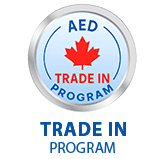
While Canada does not have a national AED mandate, many provinces and territories have introduced Legislation and incentives to expand AED access in public and private spaces.
Here is a detailed look into which Provinces have AED Legislation or Regulations:
Ontario: Bill 141, Defibrillator Registration And Public Access Act, 2020
Bill 141 became law in 2020 to enhance public access to Automated External Defibrillators (AEDs) to improve emergency response during sudden cardiac arrests. The act imposes certain requirements relating to installation, maintenance, testing, availability and testing of Defibrillators on designated premises or public premises.
Are You An Owner Of Designated Premises Or Public Premises?
Around 7,000 Ontarians experience cardiac arrest. Up to 58% of those cardiac arrests occur in a public location or at home. An event such as cardiac arrest is often witnessed by family members, friends or colleagues. Without immediate medical intervention, survival rates are extremely low 9 out of 10 people who experience cardiac arrest out of hospital do not survive.
When CPR is performed and an AED is used within the first few minutes, survival rates can increase by more than 70%. Ensuring that AEDs are properly maintained, accessible and ready for use can significantly improve outcomes in these critical moments.
Over the past decades, public venues have taken initiative to install AEDs, Bill 141 builds on this progress by requiring all designated buildings be equipped with a certain number of AEDs, visible signage, easy to locate and use when every second counts.
Bill 141 Includes:
- AED devices are required in public premises
- AED devices are required to be visible
- AED devices are required to have signage
- AED devices are required to be maintained and tested by someone (Third Party)
- AED devices are required to be tested and provide records
- AED devices are required to be registered with 911
- AED training is required for everyone who has an AED device on-site
Bill 141, Defibrillator Registration and Public Access Act, 2020 - Legislative Assembly of Ontario
UPDATE
Bill 141 New AED Mandate For Construction Sites
Bill 141 will soon introduce legislation changes which would make Defibrillator devices mandatory for certain construction sites. The Ontario government are doing what they can to protect their workers that are building their province. Ensuring that lifesaving AED machines are accessible when needed is another way of creating a safer environment for all construction workers.
Why Does This Matter?
Cardiac arrest is the leading cause of workplace fatalities with construction workers having a high risk of these events occurring. Inspection reports have revealed that over 15% of cardiac events occur in the construction sector.
Bill 141 Changes Include:
- Construction projects expected to last three months or longer.
- Construction companies that employ 20 or more workers at any given time.
- Workplace Safety and Insurance Board (WSIB) reimbursement program to assist companies with the cost of purchasing an AEDs.
AED Solutions Best AED for Construction Sites:
- ZOLL AED 3: Long Life Battery, Pads, CPR Feedback, Rugged Design, Fully-Automatic and Semi-Automatic option.
- ZOLL AED Plus: Long Life Battery and Pads, CPR Feedback, Reliable, Fully-Automatic and Semi-Automatic option.
- Philips HeartStart FRx AED: Harsh Weather, Rugged and Durable Design
- Defibtech Lifeline AED: Rubberized modeling, Durable, User-friendly and Portable
https://news.ontario.ca/en/release/1005949/ontario-protecting-workers-on-construction-sites
https://ogca.ca/2025/05/ontario-proposes-mandatory-aeds-on-construction-sites/
Other Provinces In Canada
Manitoba: The first province to pass legislation regarding AEDs: Defibrillator Public Access Act, proclaimed 2013. Manitoba requires AEDs in public spaces and owners to register devised with the Heart and Stroke AED Registry
British Columbia: Implemented Cardiovascular Health Strategy and Occupational Health and Safety Regulations. BC requires AEDs in certain workplaces, especially in high risk areas and promotes public access AED machines.
Alberta: The Emergency Medical Aid Act which provides protection from liability when someone assists a person who is ill, injured or unconscious when emergency first aid is performed. This act also supports the placement of AEDs in public places.
Saskatchewan: The Occupational Health and Safety Regulations, 2020 mandates AEDS be available in high-risk workplaces and support public installation of AED though various public health initiatives.
Quebec: The act to Ensure the Quality of the Health and Social Services includes facilitating the access of AEDs in public places and health facilities. Quebec also requires training under relevant health legislation.
Nova Scotia: The Nova Scotia’s Occupational Health and Safety Act and Regulations mandates AED in certain workplaces. Additionally, the government is promoting public AED installation and training programs for the public.
Newfoundland and Labrador: The Occupational Health and Safety Act requires AED in high-risk workplaces. Also supports the installation of AED in public places through health and safety initiatives.
Prince Edward Island: The Occupational Health and Safety Act Similar to Newfoundland and Labrador, requires AED in high-risk workplaces and advocates for installation of AED in public places and will offer education on how an AED is used.
Northwest Territories, Yukon and Nunavut: These territories emphasize the importances of having AEDs in high-risk workplaces and public areas, but it is not mandatory or have legislation in the works.
Many industries are proactively adopting AEDs as part of best safety practices.
Be proactive! AED Solutions helps you understand and meet your local requirements, ensuring compliance and peace of mind.













